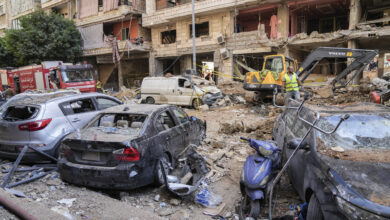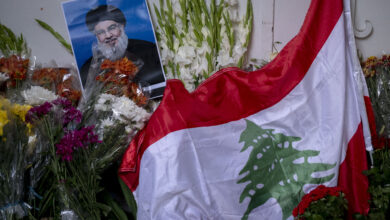Eight people were killed and seven other injured near Gwoza in northeast Nigeria’s Borno state when a vehicle hit a roadside bomb on Monday, March 18, security sources told AFP.
Military and civilian militia sources blamed Boko Haram for planting the mine, underlining the persistent threat to civilians in the remote region.
One vehicle, part of a civilian convoy under military escort, veered off the road in an attempt to overtake another vehicle when it hit the device.
“The vehicle exploded and all the eight people inside were killed,” said a military officer. “Seven more people from the other vehicle we’re injured from the explosion.”
The convoy had left Gwoza and was heading to Pulka around 18 km (11 miles) away when the incident occurred at about 10 a.m. at Warabe village, around 5 km (3 miles) south of Pulka, civilian militia leader Umar Ari said.
Gwoza is near the border with Cameroon, around 100 km southeast of Borno state capital Maiduguri, and the Boko Haram faction led by Abubakar Shekau is known to be active in the area.
There were also reports of Boko Haram attacks on Monday in Michika Local Government Area of neighbouring Adamawa state, around 70 km southwest of Gwoza.
Update March 20 Residents told AFP that militants overpowered soldiers who withdrew. The insurgents attacked a bus killing three people, and robbed and burned a bank. They left the town and drove towards Lassa after military reinforcements arrived from Gulak.
“Soldiers pursued them while vigilantes in Lassa laid in wait for them. They suffered a lot of casualties from the two fronts,” Daniel Bature said.
The Nigerian Army said troops in Lassa received a distress call from vigilantes in Maikadiri village at about 7:20 p.m. and deployed along the road, intercepting the militants and exchanging fire. Reinforcements from Gulak then engaged on a second front, and the insurgents were routed by the troops.
Boko Haram split into two factions in mid-2016. One is led by Shekau and is notorious for suicide bombings and indiscriminate killings of civilians.
Shekau pledged allegiance to ISIS leader Abu Bakr Al-Baghdadi in March 2015, but ISIS central only gives formal backing to the other faction, which is known as Islamic State West Africa province.
The ISWA faction, which largely focuses on attacking military and government targets, was led by Abu Mus’ab Al-Barnawi, but earlier this month, audio recordings revealed that ISIS appointed Abu Abdullah Idris bin Umar also known as Ibn Umar al-Barnawi as leader. ISIS has not yet made a public statement confirming the change.
In August 2014 Boko Haram captured Gwoza, which it renamed Darul Hikma (House of Wisdom). In a video released later that month that celebrated Gwoza’s capture, Shekau declared the establishment of a “caliphate” in Nigeria, and the town became Boko Haram’s headquarters.
Although Nigerian troops recaptured Gwoza in March 2015, Shekau’s faction has been blamed for attacks in the wider Gwoza area, targeting troops and displaced people in recent months.
In January, two soldiers were killed and seven civilians injured in an ambush on a convoy of traders under military escort in Chachile village.
Troops in Pulka fought off an attack by fighters believed to be from Abubakar Shekau’s Boko Haram faction on January 24.
Six days later, Nigerian troops “neutralized” five Boko Haram insurgents and captured a suspected militant in the Gwoza area.
On February 17, two soldiers were killed and six others injured fighters believed to be from the Shekau faction attacked a military location around 15 km from Banki, which is about 40 km east of Gowza..
Six days later on election day, three people were injured and a mosque was damaged when rocket-propelled grenades were fired into Gwoza from a hilltop outside the town, security sources said.
Boko Haram’s bloody insurgency began in northeastern Nigeria in 2009 but has since spread into neighboring Niger, Chad and Cameroon, prompting a regional military response. Some 27,000 people have been killed and two million others displaced, sparking a dire humanitarian crisis in the region.
Islamic State enforced leadership change in West Africa province, audio reveals
With reporting from AFP












